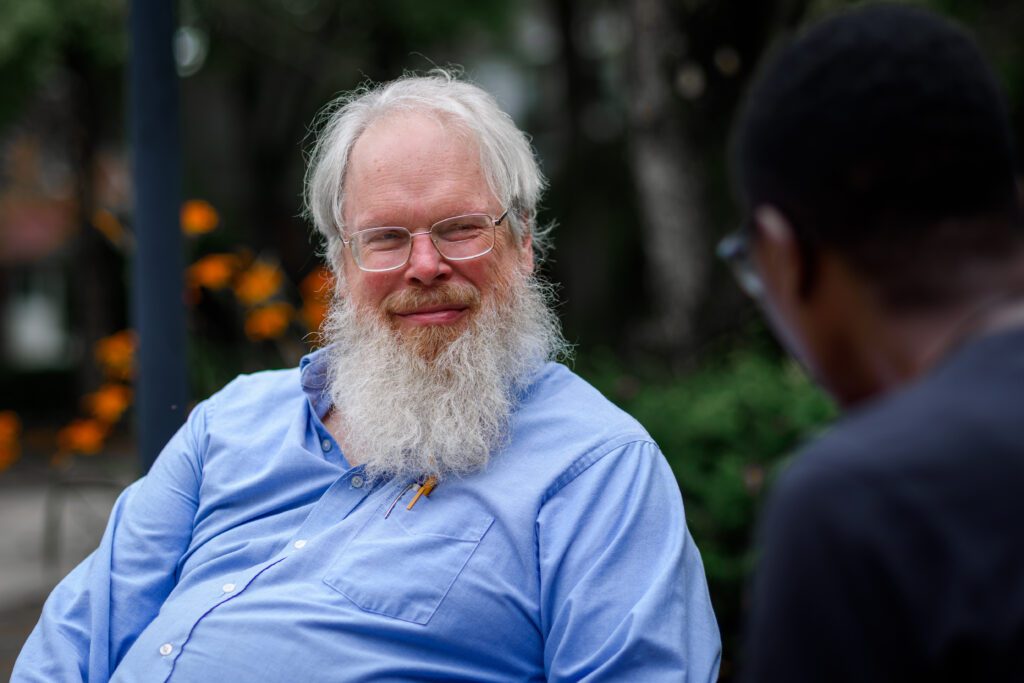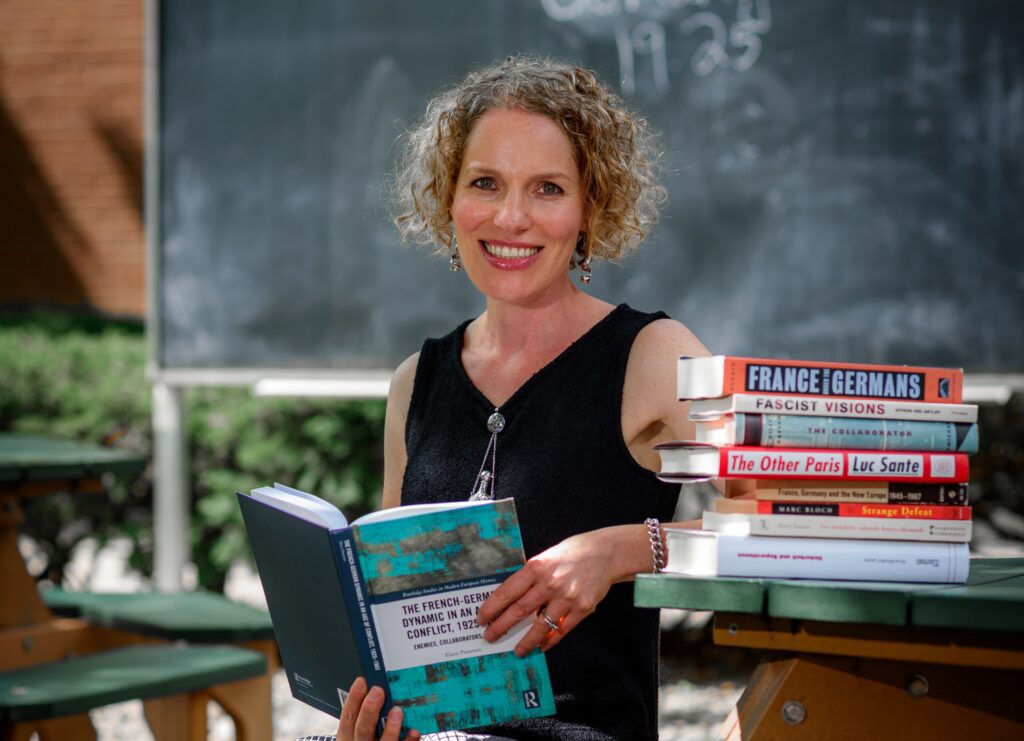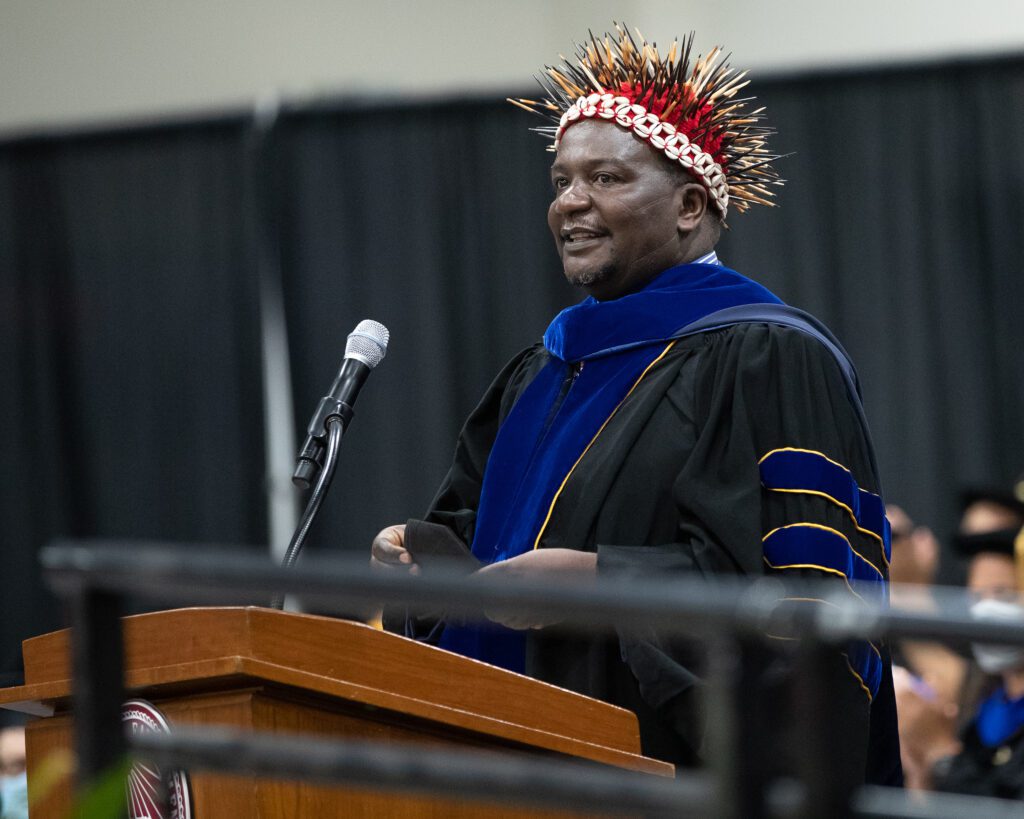You only have to go so far as annual rankings in U.S. News & World Report and The Princeton Review to see that excellence in teaching is one of the hallmarks of the Earlham experience. The college has consistently ranked among the top liberal arts institutions in the nation — and that it offers one of the nation’s best classroom experiences.
It’s no secret that the path to these rankings and to the esteem in which the College is held leads back to the dedicated, engaged and scholarly faculty. In addition to teaching excellence, many of the teaching faculty members have made their research a living, evolving component of academic work.
As community develops within a classroom or major, faculty members bring ongoing research to the table and enlist Earlham students to participate and learn from the work as it happens. These faculty document modern history as religious communities evolve, center new voices in the complex legacy of colonialism in nations in sub-Saharan Africa and beyond, challenge notions of what is worthy of serious study in Japanese literature and equip students with critical historical lenses that help them ask and answer important questions about their own futures.
Scholarship happens at Earlham where a faculty member’s deep interest meets a discipline’s rigorous standards for inquiry. This combination enriches the available course offerings at Earlham to the point that some courses on campus are investigations into subjects covered nowhere else in the world with such specificity and depth.
This work is done across campus in the offices, labs and classrooms led by preeminent scholars such as the four whose research and teaching are highlighted on the following pages.
Discovering scholarship
Faculty members at Earlham know the benefits of covering topics in both breadth and depth, wearing many hats while also teaching their students the value of sustained engagement with a topic.
Tiffany Hong (pictured above) holds both breadth and depth as valuable in her diverse scholarship as an associate professor of Japanese studies at Earlham.
“I find myself being drawn over and over to things that have been called undeserving of scholarly attention,” she says. Her work delves deep on the Japanese tradition of manga, as well as comics more broadly, and also the works of author Haruki Murakami, whose work blurs the line between literary and popular fiction.
Hong recently co-headlined as a keynote speaker at a conference on Murakami at Wellesley College, where she and three of the foremost scholars in the world spoke on the topic of reading Murakami through a feminist lens.
Hong’s thoughtful, critical eye on popular literature helps both the readers of her research and her Earlham students realize that very interesting lessons lurk behind even texts that some assume to be surface-level work.
For example, Hong’s recent course, “War Manga and Comics,” revealed to her students that the way we consume content about war is changing.
“This is the first generation to livestream war, to open an app and see something that would have been censored before,” says Hong. “We also can talk about how picking up a comic may help you engage with a war you don’t know much about, and how the differences between a cartoony style versus photorealistic drawing change how we are impacted by the content.”
Hong isn’t afraid to ask important questions about how we’re engaging with popular content, not just literature, in ways that help her students ask nuanced questions about empathy, compassion and cross-cultural communication.
Hong’s coursework also helps students find accessible and very engaging ways to understand Japanese culture in particular, even as they realize that their own areas of interest are worthy of serious inquiry and research. Her message is: “What impacts us viscerally is worthy of attention and deep consideration.” She encourages her students to follow those leads.
Writing collaboratively
Steve Angell ’82 knows the breadth and depth of religious studies research. As the Leatherock professor of Quaker studies at Earlham School of Religion, he has read extensively in the archives that can be decades or hundreds of years old, and written definitive accounts of major changes in the Society of Friends from the last 15 years.
His teaching is dynamically involved in the life of the Religious Society of Friends.
“ESR is really the center of postgraduate Quaker education in the United States, and nearly all of the work I’ve produced in the last 25 years has been on Quaker themes,” says Angell.

“ESR is really the center of postgraduate Quaker education in the United States, and nearly all of the work I’ve produced in the last 25 years has been on Quaker themes.”
— Steve Angell, Leatherock professor of Quaker Studies, Earlham School of Religion
Angell likes writing collaboratively and has found long-term collaborations with scholars both near and far. His recent three-book series The Separation Generation explores in-depth how various Quaker associations have experienced schisms on important doctrinal points in the past 20 years.
He worked with noted Quaker scholar, author and activist Chuck Fager as well as ESR student Jade Rockwell ’25 (née Souza) on the three books. Angell is proud of the collaborative spirit within the Quaker studies community, and he helps students consider where their own research might find its best publication home.
“I’m always happy to recommend places to my students and to help them revise for publication,” says Angell. “The students are pretty resourceful though; sometimes, all I have to do is bless them and let them go.”
Angell’s work is inextricable from the discussions that go on in his classroom. He sees this enmeshed version of teaching and research as part of studying religion in community.
Researching cooperation
Elana Passman’s research drills deep into a particular historical era and area of the world, but also asks the bigger questions about cooperation, conflict and how we imagine others outside our personal groups.
In February 2025, the history professor’s book The French-German Dynamic in an Age of Conflict, 1925-1963 was published by Routledge and offers an in-depth case study of a radical transformation in international relations that is instructive for other contexts where ongoing conflict and a need for peace and cooperation exist.
“An idea took hold that is the French and Germans had always been enemies, a hereditary enmity, a primordial hatred going back to the Middle Ages,” says Passman. “I wanted to flip the script and think about how, throughout this tremendous conflict, some people worked to bridge seemingly insurmountable divides.”

“An idea that took hold is that the French and Germans had always been enemies, a hereditary enmity, a primordial hatred going back to the Middle Ages. I wanted to flip the script and think about how, throughout this tremendous conflict, some people worked to bring seemingly insurmountable divides.”
— Elana Passman, professor of history
Passman’s research in the archives informed her book project, but her teaching and work in the Earlham community also cross-pollinated the work. She has taught coursework on cooperation and internationalism across wider contexts with her own research as a valuable focal point for her students to consider.
Earlham students are eager to bring their own wisdom to important questions such as how cooperation happens. Passman has taught the capstone course for the history major many times, and throughout that inquiry process, she helps students find the intersections between their own interests and the existing conversations in historical study.
“I encourage them to follow their passions. Then we work to figure out how to shape that passion,” says Passman.
Passman also advises the Fulbright applicants at Earlham, drawing on her own experiences using research grants and funding that build space for deep study, long-term engagement with archives or the opportunity to teach English in a different country and gain valuable cultural exposure. She helps them clarify their ideas, but, she says, Earlham students consistently shine in the application process. Under her leadership, Earlham has been recognized as one of the nation’s top Fulbright-producing institutions on multiple occasions.
“Something I find marvelous is how Earlham students are such original thinkers that they sometimes have trouble deciding among different fabulous ideas,” says Passman.
Shaping history
Earlham’s student body and faculty hail from all over the world, which enriches both the research environment and classroom discussions.
Womai Song, director and associate professor of the African and African American Studies Program, as well as associate professor of history, was born and raised in Cameroon, with his lived experiences informing his long-term investigation into the colonial and post-colonial experiences of sub-Saharan African communities.
The manuscript for Song’s upcoming monograph is under review by Indiana University Press and is tentatively titled In the Eye of the Storm: Auguste Ngom Jua and Anglophone Cameroon Nationalism. His work has been in development as he teaches many of the crucial courses in AAAS, history, and peace and global studies at Earlham. Song’s courses and the book project help inform each other.
“This project partly interrogates the themes of neo-colonialism, decolonization and Pan-Africanism in the shaping of Juaism in post-colonial Cameroonian experience,” says Song.
“Discernment from archival sources and analysis from secondary literature have greatly informed my teaching in some of my courses, including Neo-colonialism, Pan-Africanism, History of Southern Africa, Introduction to African and African American Studies, and African History Since 1880.”

“Discernment from archival sources and analysis from secondary literature have greatly informed my teaching in some of my courses, including ‘Neo-colonialism,’ ‘Pan-Africanism,’ ‘History of Southern Africa,’ ‘Introduction to African and African American Studies,’ and ‘African History Since 1880.'”
— Womai Song, director and associate professor of African and African American History program
Song’s research has uncovered histories that haven’t been widely told and archival documents that bring important voices to the forefront as world politics grapple with the enduring impacts of enslavement/colonialism in sub-Saharan Africa and the reality of epistemic violence — the extermination or annulment of knowledge in the Pan-African experience.
“I intentionally challenge the students to center Black folk in the analysis of their historical and contemporary experiences,” says Song. “I learn every day from my students. Over the years they have pushed me to be more intentional in centering the contributions especially of Black women, who are often marginalized in historical analysis.” Song sees the opportunity to bring his own longstanding research and his students’ passions and concerns together, forwarding the next generation of scholars even as his own work contributes to vital conversations right now.
“I consistently and persistently nurture my students towards finding their own voice during their academic sojourn at Earlham College,” says Song. “This is particularly the case for those intending to pursue an academic career, where finding and sustaining a niche requires passion in the context of other major determining factors.”
This story was written by Laura Leavitt for the Earlham College Office of Marketing and Communications. The story originally appeared in the fall 2025 edition of Earlhamite magazine.
***
About Earlham College
Earlham College and Earlham School of Religion foster a collaborative learning community that inspires and motivates students with transformative opportunities and experiences so they can become catalysts for good in a changing world. Located in Richmond, Indiana, Earlham is one of U.S. News & World Report’s Top 75 national liberal arts colleges and offers one of the top 20 classroom experiences in the nation, according to the Princeton Review.
Media contact
Brian Zimmerman
Assistant vice president of marketing and communications
Email: [email protected]
Phone: 765.983.1256